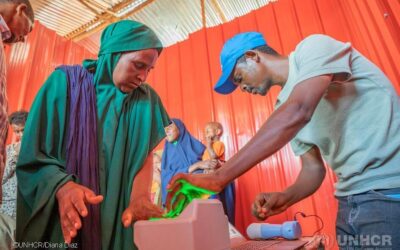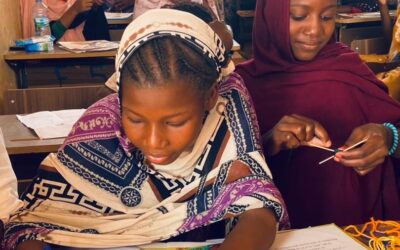Our Latest Articles
A Pen Through Time: Nicholas Morris’ 27-Year UNHCR Journey
In every journey, countless stories are born. Imagine being an envoy for over 27 years with a humanitarian organization like UNHCR – how many tales await narration? Beyond that, consider the wealth of valuable information one can accumulate for research or organizational purposes. Nicholas Morris was one such precious staff member who worked for UNHCR from 1973 until 2001, with hundreds of fascinating stories to share.
Biometrics innovation: Transforming the way we collect fingerprints at UNHCR
In 2002, UNHCR introduced biometrics, and leveraged the technology to manage the identity of the people it serves effectively. By capturing up to 10 fingerprints, 2 irises and a face photo during the initial encounter, biometrics play a crucial role from confirming an individual’s physical presence to providing assistance. UNHCR’s Biometric Identity Management System (BIMS) serves a diverse user base including UNHCR staff, partners, governments, and soon refugees themselves through self-service applications, all in a user-friendly manner. While BIMS has undergone countless improvements throughout the years, the biometric scanner devices used have remained largely unchanged.
Measuring foundational learning in forced displacement: field insights and lessons
As part of a larger holistic learning measurement project to address the lack of data on learning outcomes of refugee children, UNHCR piloted a learning assessment in Mauritania.
Transforming lives through education: a brighter future for refugee children
Imagine a world where every child, regardless of their circumstances, has the chance to learn, grow, and succeed. For refugee children, education is not just a right; it’s a pathway to self-reliance. Over the past decade, we’ve seen a global movement recognizing the urgency of integrating refugee children into national education systems as swiftly as possible. Yet, the reality is stark: many refugee children are still missing out on this vital opportunity. Around a third of primary school-aged refugee children remain out of school (UNHCR, 2023). It’s time to change that.
Aligning public and private interests to advance financial inclusion for displaced persons and their hosts
What makes for effective public-private partnerships when it comes to advancing financial inclusion? Having common goals, trust, and knowing the strengths and limitations of partners.
A century of mobility: A glimpse into the history of refugee travel documents
By Charalampia Armpounioti and Amanda Stovall © UNHCR/Jose Cendon The idea of travel documents for refugees dates back to Fridtjof Nansen, first High Commissioner for Refugees, who introduced the Nansen passport. An exhibition aimed to shed light on the history of...
The private sector increases work-based integration for Venezuelan refugees and migrants in Colombia
Effectively integrating refugees and migrants in labour markets boosts productivity, increases the availability of skilled workers, and drives economic growth.
The journey to build a new open data finder on forced displacement that includes thematic data: Part 1
In 2017, the United Nations Statistical Commission adopted an indicator framework of 231 unique indicators to monitor the progress towards the Sustainable Development Goals (SDGs). Similarly the World Bank tracks 1,400 indicators on development and UNICEF over 680 on women and children. But what about the visibility of refugees, stateless, and other people affected by forced displacement?
Presenting the UNHCR Archives: A Short Film
The UNHCR Archives: A Short Film. © UNHCR “To see [in the records] the UNHCR and the Thai Marine Police conducting an anti-piracy campaign … I think helped with the healing. It reminds us that there is humanity buried underneath the inhumanity in our world” Tiffany...
Inclusion of Forcibly Displaced and Stateless Persons in National Statistics
Forcibly displaced persons, including refugees and internally displaced people (IDPs), as well as stateless persons are frequently underrepresented or invisible in national data. However, realiable and nationally owned data is vital to guide effective national policies and decisions that foster the inclusion of forcibly displaced and stateless persons around the world. Statistical inclusion of forcibly displaced and stateless persons refers to the process of systematically including these groups in national data production systems such as population and housing censuses, administrative registers or nationwide household surveys.
Welcome to the UNHCR Records and Archives Blog!
Welcome to UNHCR’s newest blog, from the UNHCR Records and Archives Section, a window into the history we hold, those we assist, and the challenges and rewards of recordkeeping in a humanitarian context.
Inclusion statistique des réfugiés et des rapatriés au Burundi : une approche localisée pour collecter des données de bonne qualité
Par Ilgi Bozdag et Felix Ndama Wa Ndama L’UNHCR a mené sa deuxième enquête de suivi des résultats au Burundi en 2023 avec les rapatrié.e.s près de la frontière tanzanienne, dans la commune de Muyinga. ©GNK/Diane Kaneza Le Burundi, pays...












